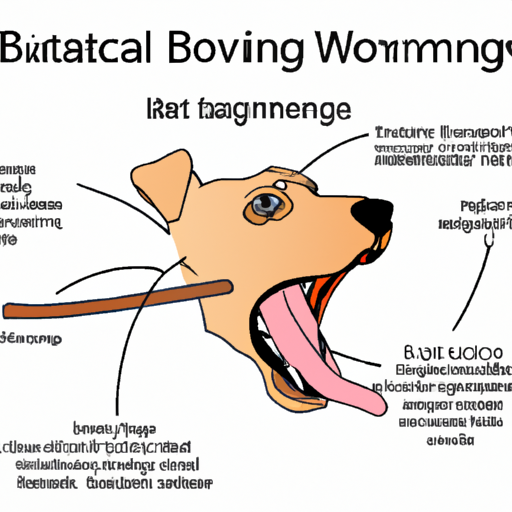If you’ve ever played with a pup or owned a dog, you’ve probably experienced what is commonly referred to as ‘mouthing.’ This behavior involves a dog putting its mouth over a person’s hand, arm, or other body parts without actually biting down. While it may seem like a harmless act, it’s essential to understand why dogs engage in this behavior and how to respond to it appropriately.
Table of Contents
– Understanding Dog’s Mouthing Behavior
– Reasons Behind Mouthing
– How to Correct Mouthing in Dogs
– Frequently Asked Questions
Key Takeaways
– Dogs mouth as a form of communication and play while they’re young.
– The behavior can be carried into adulthood if not correctly addressed.
– It’s crucial to teach appropriate behavior to prevent mouthing from escalating into biting.
Understanding Dog’s Mouthing Behavior
Just like how human babies explore their world by putting everything in their mouths, puppies do the same. Mouthing is a normal part of a puppy’s development. It’s how they learn about their world and interact with their siblings and other dogs. However, this behavior can sometimes extend into adulthood, which can be a cause for concern, especially if the mouthing is hard or becomes aggressive.
It’s important to remember that dogs don’t have hands like we do. Their mouths serve as their primary tool for exploring and interacting with their environment. Mouthing can also be a way for dogs to initiate play or to express their needs. The key is to understand what your dog is trying to communicate and respond in a way that promotes positive behavior.
Reasons Behind Mouthing
There are several reasons why dogs mouth, and it’s crucial to understand the root cause of this behavior to address it effectively. Here are some common reasons dogs mouth:
-
Play: Dogs often mouth when they’re playing. It can be a way for them to engage with their playmate, whether it’s another dog or a human.
-
Teething: Puppies mouth more frequently when they’re teething, which typically occurs between 4 to 6 months of age.
-
Communication: Dogs use mouthing as a form of communication. It can be a way for them to get your attention or express their needs.
-
Stress or Anxiety: Some dogs may mouth when they’re stressed or anxious. It can be a coping mechanism for them to deal with their emotions.
-
Dominance: Although less common, some dogs may use mouthing as a way to establish dominance. This behavior should be addressed immediately to prevent it from escalating.
How to Correct Mouthing in Dogs
While mouthing is a natural behavior for dogs, it’s essential to teach them appropriate behavior to prevent it from becoming a problem. Here are some strategies to correct mouthing in dogs:
Redirect the Behavior
Whenever your dog starts to mouth, redirect their attention to a toy or chew. This will teach them that it’s okay to mouth these objects but not people.
Use Positive Reinforcement
Reward your dog for not mouthing. For instance, if they play without mouthing, give them a treat or praise them.
Teach Bite Inhibition
Dogs need to learn to control the force of their mouth so they can regulate it when they play. You can teach this by letting out a high-pitched yelp whenever they mouth too hard, signaling to them that they’ve gone too far.
Seek Professional Help
If your dog’s mouthing is persistent or aggressive, it might be best to seek help from a professional dog trainer or behaviorist.
Remember, it’s crucial to be consistent and patient when correcting your dog’s behavior. The goal is not to punish them but to teach them appropriate behavior.
Frequently Asked Questions
1. Is mouthing the same as biting?
No, mouthing is not the same as biting. Mouthing is when a dog puts its mouth over a person’s hand or body part without biting down, while biting involves the dog clamping down with its teeth.
2. Is mouthing a sign of aggression?
Not necessarily. While mouthing can sometimes be a sign of dominance or aggression, it’s often just a way for dogs to play or communicate.
3. How can I tell if my dog’s mouthing is a problem?
If your dog’s mouthing is hard, persistent, or causing distress to people, it may be a problem. It’s also a concern if your dog is showing other signs of aggression when mouthing.
4. What should I do if my dog won’t stop mouthing?
If your dog won’t stop mouthing despite your efforts, it may be best to consult with a professional dog trainer or behaviorist.
For more information on dog behaviors and training tips, visit One Top Dog. Here are some articles that might be helpful:
- How to Stop Your Dog from Jumping
- Understanding Your Dog’s Body Language
- Training Tips for New Dog Owners
Understanding why dogs mouth and how to address it is crucial for every dog owner. With patience and consistency, you can guide your dog towards better behavior. Remember, every interaction with your dog is an opportunity to learn and reinforce positive behaviors.



